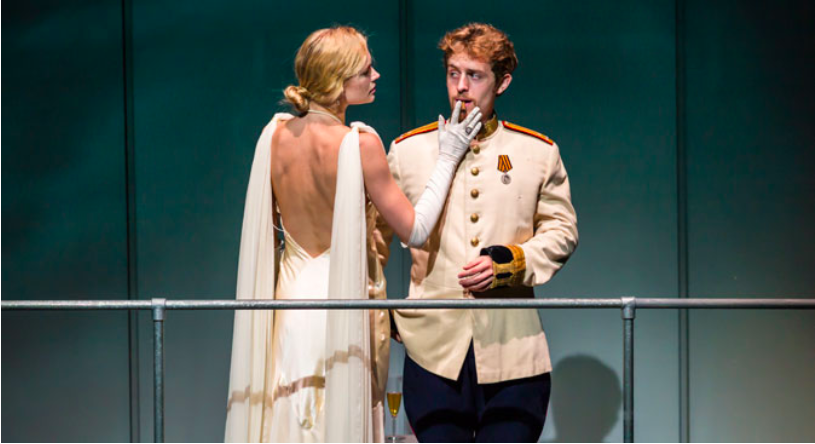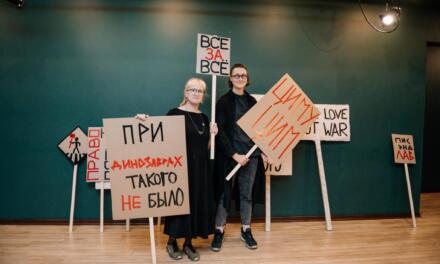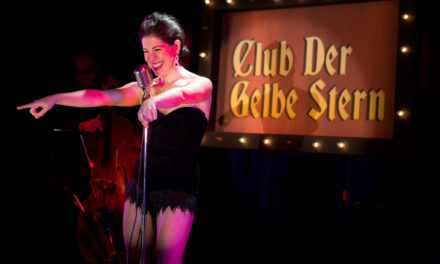A dancer in a kimono writhes on the ground, while two huge screens pan across rumpled bed sheets. This was the erotic climax of a new, Russian-inspired drama in the über-trendy setting of London’s Platform Theatre.
Belka Productions, which has combined short stories by Anton Chekhov and Ivan Bunin to create the new play, Sunstroke, are one of several young theatre companies with Russian ambitions. Belka aims to create “bold, physically expressive and imaginative productions of Russian texts that have rarely been presented to English audiences.”
Visual and Inventive
In Belka’s latest effort, the stage is covered in sand. A golden sunset and a wave-noise soundtrack set the scene for a romantic cruise. A self-consciously beautiful woman in an Edwardian-style, white bathing suit is flirting with a man in a deckchair. She is Russian model Katia Elizarova, making her stage debut in London this month in Sunstroke.
Elizarova told the Evening Standard: “I’ve been reading Chekhov and Bunin since school, and to bring part of my own heritage to the eyes and ears of the British public is a big honor for me.” Elizarova has been the face of Chanel and Versace, and this production maximizes her decorative and PR potential.
Director Oleg Mirochnikov, who celebrates the theatrical techniques of Stanislavsky, Meyerhold, and (especially) Vakhtangov, says: “We wanted the physical language to speak as much as the text… We’ve sought to place these stories in a highly visual and inventive landscape within which [they] could say something to contemporary audiences.” What unites both stories, Mirochnikov explains, is the idea that “a man can be transformed through love.” William Boyd tried something similar earlier this year in Hampstead, when he combined two of Chekhov’s tales into the wistful hybrid, Longing.
Belka staged the U.K. premiere of Leonid Zorin’s A Warsaw Melody last year at the innovative Arcola Theatre—an East London venue with an outstanding track record in Russian theatrical events. The Arcola has recently hosted several great productions of Chekhov and another British premiere, Alexander Ostrovsky’s Bespridannitsa. Next year, Belka plans to fuse two stories by Vladimir Nabokov and present them at the New Diorama—another dynamic London theatre with a Russian flavor in its repertoire.
A Unique Phase Of Experimentation
Sputnik Theatre’s production of Elena Gremina’s One Hour Eighteen Minutes at the New Diorama last year showcased their dedicated, experimental style. The documentary play about the death of Sergei Magnitsky used multi-media and ensemble techniques to create a compelling drama.
Sputnik’s artistic director, Noah Birksted-Breen, says: “We believe that Russia is one of the most exciting countries in the world for contemporary playwriting. The whole world knows about Chekhov and Russia’s tradition of theatre, but the real secret is that Russia has a whole generation of young playwrights with talent, ideas, and ambition. Sputnik is committed to bringing this new generation of playwrights to the attention of British audiences.”
Birksted-Breen, who speaks fluent Russian and studied at St. Petersburg State University as part of his degree, told RBTH: “I founded Sputnik in 2005 when I realized what an exciting new playwriting scene existed in Russia… Russian playwriting is, in my view, in a unique phase of experimentation: Many playwrights are looking for new subjects and forms, to engage with the state of Russian society today.”
This month Birksted-Breen is searching for new plays and playwrights at the Lyubimovka Festival in Moscow. “We are currently sourcing 5–6 new Russian-language plays for translation and staging in the U.K. between now and 2015,” he says. Their collaborative project is called “Alternative Voices from an Acquiescent Society: the New Wave of Russian Playwrights.”
Despite their similarly space-themed names, Sputnik’s agenda feels radically different from Belka’s. Sputnik seeks to showcase “a community of ‘creatives’ who are resisting the increased authoritarianism and endemic corruption of the present leadership,” says Birksted-Breen. Sputnik’s next performance will be a staged reading of Mikhail Khodorkovsky’s prison diaries in October. Belka’s possibly more cautious aim is to “act as a focus for Anglo-Russian cultural exchange.”
Sci-Fi And Solzhenitsyn
The Actor’s Touring Company, which produced Ivan Viripaev’s Illusions in London last year, is working on a series of new plays about Russian émigré life in New York called The Boardwalk Trilogy. One of the plays, Mikhail Durnenkov’s “poignant, sci-fi romp,” imagines Russia has disappeared and it is up to Brooklyn’s Russian community, with their matchstick models of the Kremlin and concerts of Silver Age poetry, to preserve its heritage and culture.
Southwark Playhouse also seems to have caught Russian fever. They staged a vibrant new version of Chekhov’s Seagull last November and have “another Russian play” lined up for 2014. Next month, they are presenting The Love Girl and The Innocent—a four-act play by Alexander Solzhenitsyn, set in a Stalin-era prison camp. The play is a love story but prefigures Solzhenitsyn’s later works (such as the Gulag Archipelago), and its themes of sex, power, and corruption are as topical as ever.
Oliver King, who co-founded Belka Productions after studying at the Boris Shchukin Institute in Moscow, is enthusiastic about the inspirational power of Russian theatre. “Russia is the home of modern drama,” he told RBTH. “The style of naturalism that we’ve come to expect today comes directly from Stanislavsky and other pioneers… They have influenced drama more than anyone else in the last 150 years.” The theatre is to Russians what soccer is to the English, he says: “It’s a core part of their soul.”
This post originally appeared on Russia Beyond on
This post was written by the author in their personal capacity.The opinions expressed in this article are the author’s own and do not reflect the view of The Theatre Times, their staff or collaborators.
This post was written by Phoebe Taplin.
The views expressed here belong to the author and do not necessarily reflect our views and opinions.


















